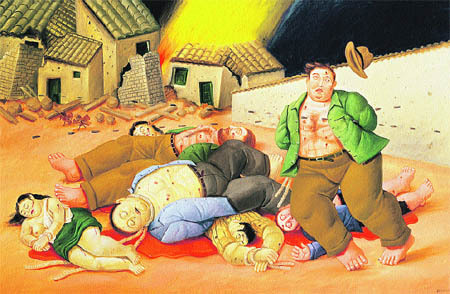(UPDATED) In his final debate with John McCain, President-elect Barack Obama made it clear why he opposed passage of the Colombia Free Trade Agreement (FTA) - because of the problem with union assassinations in Colombia (still the highest in the world) and because the Colombian government has failed to investigate and prosecute those killings. This statement echoed Speaker Nancy Pelosi who, just last year, set forth the yard marks which were necessary for consideration for the Colombia FTA - namely, "concrete and sustained" results in dealing with continued violence against trade unionists, impunity and the role of paramilitary groups in that violence.

Fernando Botero, "Masacre"
On the issue of impunity, the Colombian government has successfully investigated and prosecuted around only 3% of the almost 2700 union killings since 1986, resulting in an impunity rate of 97%. And, recently, the Colombian Office of the Attorney General confirmed that this impunity rate will not be appreciably lowered.
Indeed, as Human Rights Watch recently explained in a letter to Nancy Pelosi, Congressman George Miller and Congressman Charles Rangel, "[t]he Office of the Attorney General reports that as of October 20, the specialized prosecutors unit is only reviewing a total of 1,272 cases involving anti-union violence - including both threats and killings (even though nearly all of the 2,685 reported killings and more than 3,700 threats remain unresolved)." (emphasis added).
In short, impunity will not decrease very much in Colombia because the Colombian government, by its own admission, is not even looking into the vast majority of anti-union violence cases. This is an incredible admission by the Colombian government given its continued full-court press for passage of the Colombia FTA. This admission should finally end Colombia's chances at passage of the FTA, at least so long as Barack Obama is President and Nancy Pelosi is Speaker of the House.
What's more, the other key issue blocking passage of the FTA - ongoing anti-union violence - continues to be a big problem. As Human Rights Watch noted in its same letter, "[a]fter dropping to 39 last year, the number of killings has increased once again in 2008. Through October, 41 trade unionists have been reported killed, compared with 33 through October 2007. More than 150 unionists have reported being threatened so far this year."
Addressing Speaker Pelosi's third concern about continued paramilitary violence in Colombia, particularly against trade unionists, Human Rights Watch makes it clear that this problem remains grim and is actually getting worse. Indeed, as Human Rights Watch noted, while there was some temporary abating of paramilitary violence as a result of the demobilization which accompanied the "Justice and Peace" process, the paramilitaries are now re-mobilizing. As Human Rights Watch explained, "new armed groups often led by mid-level paramilitary commanders have cropped up all over the country. The Organization of American States (OAS) Mission verifying the demobilizations has identified 22 such groups, totaling thousands of members. The groups are actively recruiting new troops and are committing widespread abuses, including extortion, killings, and forced displacement."
These conclusions about the paramilitary resurgence in Colombia were just reinforced by a Dec. 5, 2008, L.A. Times article by Chris Kraul, entitled, "Paramilitary groups still spread terror among Colombia's people." This article concluded that, in spite of President Uribe's denial of the existence of any paramilitarism in Colombia, there are as many as 100 new paramilitary "gangs" in Colombia, "including as many as 10,000 fighters." As this article reports, the rise of these new death squads is "creating an enormous catastrophe" with massive new displacements of people, adding to the already almost 4 million internal refugees -- the second largest in the world. According to the L.A. Times, the hyper-violent Black Eagles "may account for half of the newly emerged fighters."
The strong re-emergence of the paramilitary death squads does not bode well for trade unionists, for as Colombia's Office of the Attorney General reported in March of 2008, of all the persons convicted of killing unionists, 73% belonged to paramilitary groups.
Finally, the Colombian government continues to turn a blind eye to the participation of government officials and major corporations in the murder of unionists. As Human Rights Watch explained, the Colombian government has done little to investigate the credible allegation that Jorge Noguera, the former chief of Colombia's DAS (the analogue of the FBI which has actually received U.S. monies to protect unionists) passed a hit list with the names of trade unionists to the paramilitaries with the intent that the paramilitaries carry out the assassination of said unionists.
Further, Human Rights Watch noted that the Colombian government has failed to abide by the order of a well-respected judge to investigate the role played by the Nestle Corporation in the murder of union leader Luciano Romero. The issue of such corporate responsibility in the murder of trade unionists continues even as Colombia, on December 6, commemorates the 80th anniversary of the massacre of striking banana workers in the town of Cienaga, Colombia at the behest of then United Fruit Company (now, Chiquita Banana, a company which has continued to fund atrocities in Colombia). This event inspired Gabriel Garcia Marquez's portrayal of the murder of banana workers in One Hundred Years of Solitude - a book I am told is the very favorite of none other than Speaker Nancy Pelosi.
Sadly, this history of anti-union violence at the hands of elites in Colombia is repeated today on a regular basis. And, to put an end to this, Congress must continue its refusal to consider passage of the Colombia FTA.
